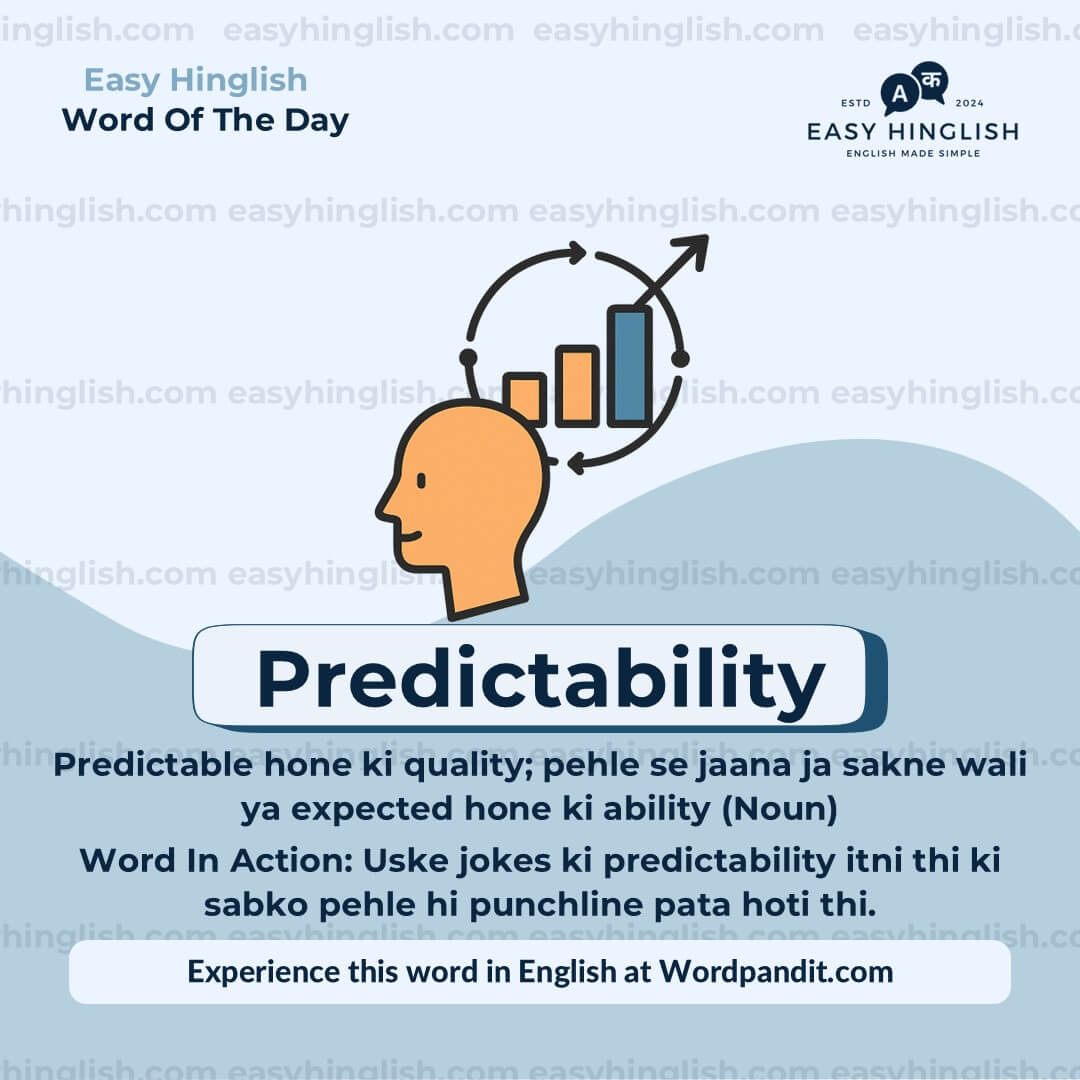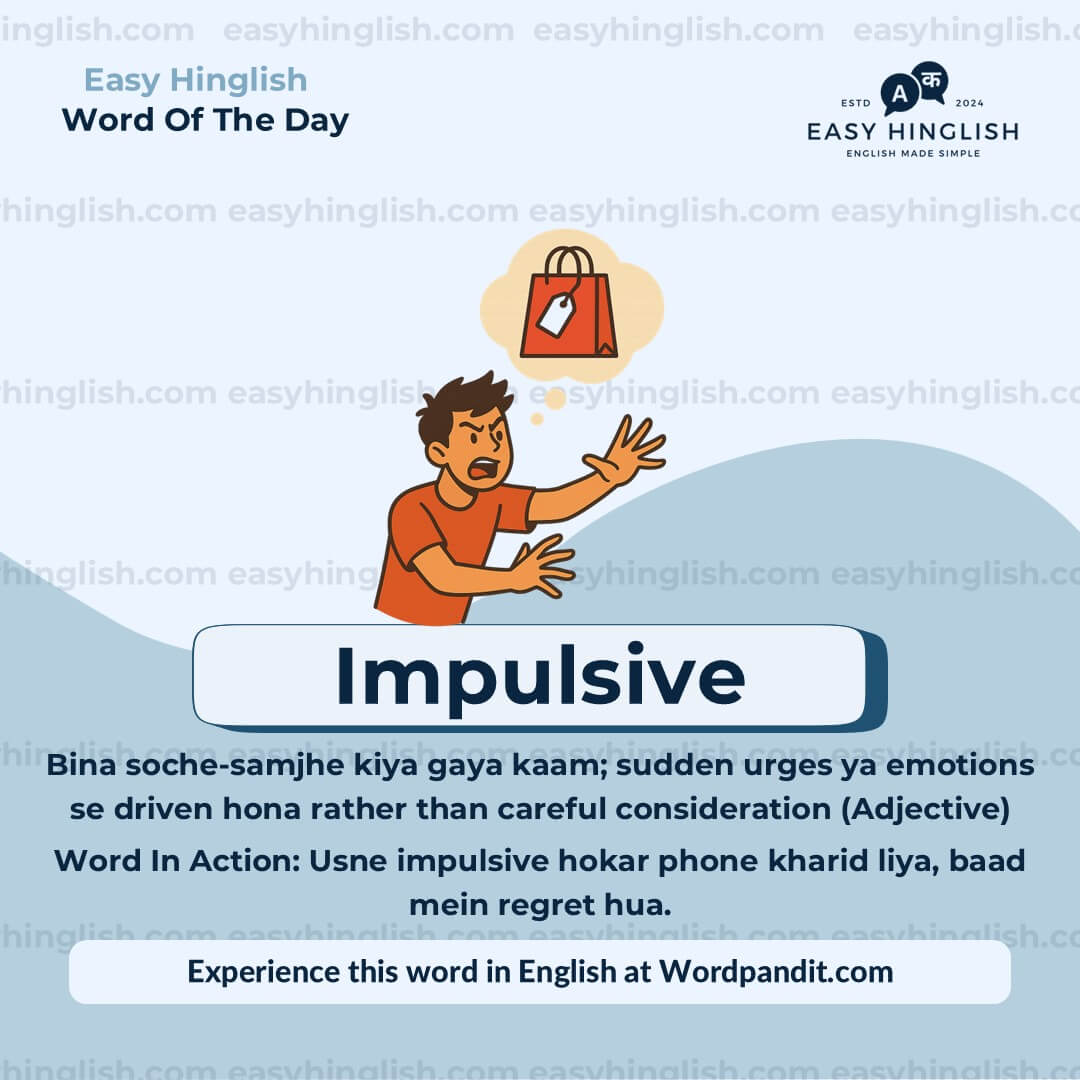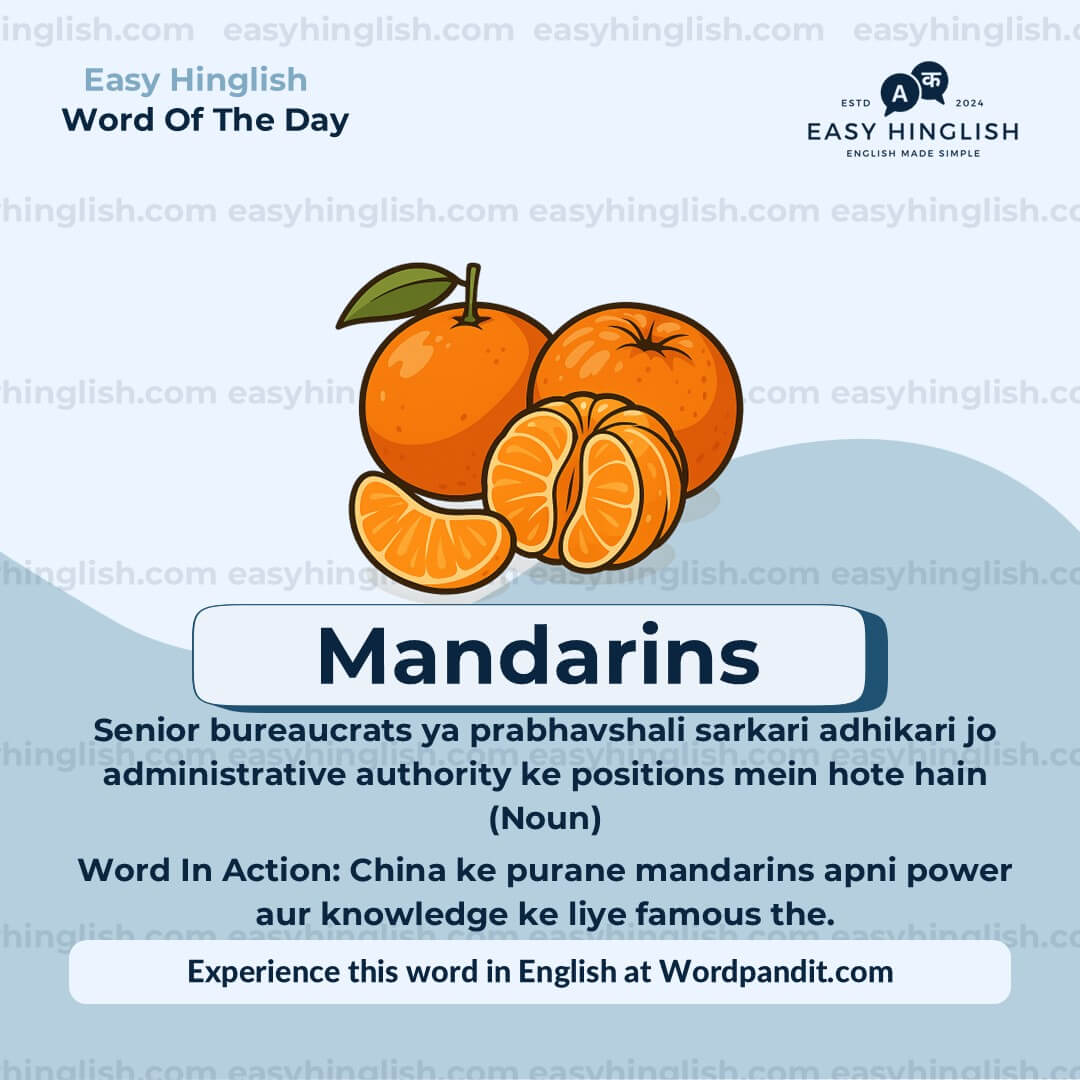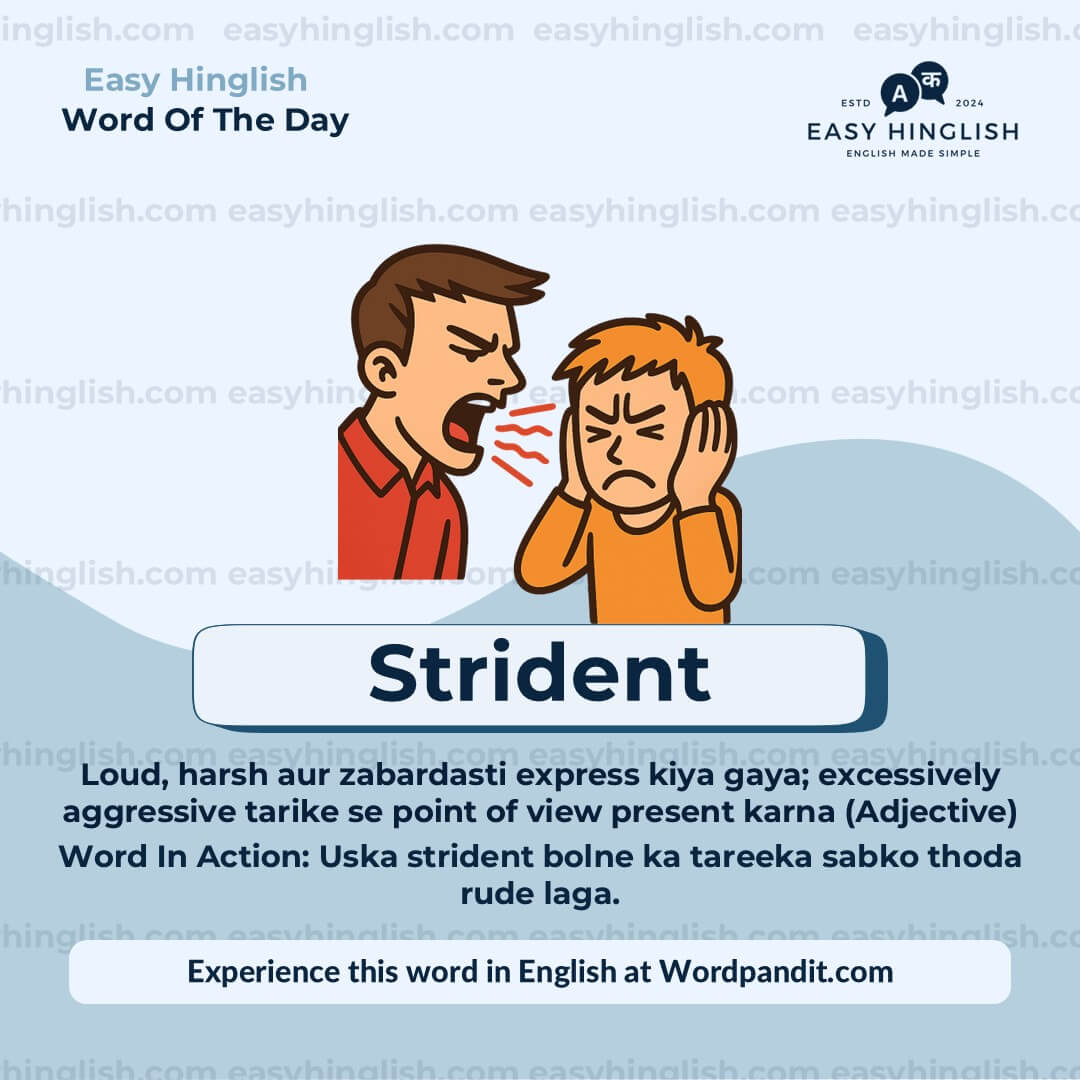Daily Vocabulary Indian Newspapers aur Publications se Seekho
Welcome to Wordpandit ka Indian Vocabulary Hub
Wordpandit par, hum samajhte hain ki ek achhi vocabulary develop karne ke liye local context samajhna bhi zaroori hai. Is section ka focus hai aapke vocabulary ko India ke leading newspapers aur publications se naye shabdon aur phrases ke zariye improve karna, taaki aap practical, relevant, aur uniquely Indian words seekh sakein.
Indian Sources Itne Important Kyun Hain?
Hum maante hain ki kisi bhi language ko sikhne ka sabse best tareeka hai uske local content me immerse hona. Isi wajah se hum carefully words curate karte hain top Indian newspapers aur publications se, jaise:
- The Hindu
- The Times of India
- The Economic Times
- Hindustan Times
- Live Mint
- The Indian Express
- Aur bhi bahut saare...
Hamesha Updated Raho, Hamesha Relevant Raho
Daily updates ke saath, aap Indian news sources se naye words seekhoge jo Indian society aur culture ke latest trends ko reflect karte hain. Hamara focus hai aise words provide karna jo aapke liye real-world me useful ho.
Wordpandit Aapke Learning Goals Ko Kaise Support Karta Hai?
Chahe aap exams ki preparation kar rahe ho, professional communication improve karna chahte ho, ya sirf naye words seekhna chahte ho, Wordpandit har step par aapki madad karega.
Practical Tareeke Se Seekho
Hamari interactive learning methodology me real-world examples, engaging activities, aur context-based usage shamil hain, taaki har naya shabd aapki active vocabulary ka hissa ban sake.
Aaj Hi Indian Vocabulary Seekhna Shuru Karo!
Wordpandit Kyun Choose Karein?
Practical Learning: Aise words seekho jo aapko real-world reading aur communication me sach me kaam aayenge, taaki aapki comprehension aur bolne ki skills improve ho.
Diverse Content: Current affairs se lekar scientific breakthroughs tak, hamare different sources aapko multiple domains ka vocabulary sikhate hain.
Effortless Integration: Wordpandit ko apni daily routine ka part banao. Sirf kuch minute har din dene se aapki vocabulary time ke saath kaafi improve ho sakti hai.
Aapka Vocabulary Mastery Tak Ka Safar
- Regularly hamare Daily Vocabulary section ko visit karo
- Naye words explore karo aur unka context me use samjho
- In words ko apni writing aur bolne ki practice me use karne ki koshish karo
- Jaise-jaise aapke words badhte hain, apni progress ko track karo
Aaj Se Apni Vocabulary Journey Shuru Karo!
Wordpandit ke saath vocabulary improve karna start karo. Roz thoda effort dalne se aap ek strong vocabulary develop kar sakte ho jo academic, professional, aur personal life me kaafi kaam aayegi.
Yaad rakho, ek naya shabd roz seekhna linguistic limitations ko door karne ka best tareeka hai! Wordpandit ko apni daily learning journey ka sathi banao aur vocabulary excellence ki taraf badho!
WORD-1: Quandary
Sandarbh (Context):
"The quandary faced by Indian foreign policy strategists…" - The Hindu
Vyakhya (Explanatory Paragraph):
Quandary ka matlab hai 'ek aisi mushkil situation jahan aap decide nahi kar paate ki kya karna chahiye, kyunki har option equally challenging lagta hai.' Yeh word tab use hota hai jab koi do ya zyada difficult choices ke beech mein fas jaye aur samajh na aaye ki kaunsa decision sahi hoga. Quandary ko formal writing, newspaper editorials, policy discussions aur competitive exam passages mein use karte hain jab complex decision-making scenarios describe karna ho jahan har choice ke serious consequences hote hain.
Arth (Meaning): Mushkil situation mein kya decision lena hai, yeh samajh na aana; confusion aur uncertainty ki halat (Noun)
Uccharan (Pronunciation): KWON-duh-ree (क्वॉन्डरी)
Kathinai Star (Difficulty Level): ⭐⭐⭐ Intermediate
Utpatti (Etymology): Quandary 16th century mein English mein aaya, possibly Latin word 'quando' se jiska matlab hai 'when,' jo us moment ko reflect karta hai jab aap confusion mein fas jate hain. Yeh word evolve hua aur ab iska use us frozen moment ko describe karne ke liye hota hai jab multiple paths equally problematic dikhte hain aur decision lena mushkil ho jata hai. Interesting baat yeh hai ki iska uncertain origin bhi usi confusion ko mirror karta hai jo word khud describe karta hai.
Prashant Sir Ke Tathya (Prashant Sir's Notes):
Bahut students poochhte hain: quandary aur dilemma mein kya farak hai? Dono difficult choices describe karte hain, lekin quandary ka sahi istemal tab hota hai jab confusion aur perplexity emphasize karni ho ki kya karna chahiye, jabki dilemma specifically do undesirable options ke beech choice ke liye use hota hai. CAT aur GRE ke students ke liye, quandary aksar RC passages mein dikhta hai jab policy decisions, ethical debates ya strategic challenges discuss ho rahe hon. Indian newspapers mein aapko 'caught in a quandary' ya 'faces a quandary' phrases aksar milenge, especially The Hindu aur Indian Express ke editorials mein jab government ki complex diplomatic ya economic situations ka analysis ho raha ho. Exam mein agar author kisi indecisive situation ka vivid description de raha hai with multiple conflicting options, toh 'quandary' perfect word choice hai.
Samanarthi & Vipritarthi (Synonyms & Antonyms):
Samanarthi (Synonyms): dilemma, predicament, plight, impasse, difficulty, perplexity, puzzle, confusion, bind, fix, panchhi (colloquial)
Vipritarthi (Antonyms): certainty, clarity, solution, resolution, decision, confidence
Udaharan (Usage Examples):
- Indian government climate summit ke baad ek badi quandary mein thi: economic growth ko badhana ya environmental protection ko priority dena.
- Priya real quandary mein fas gayi thi: Bangalore mein high-paying job accept kare ya Mumbai mein rehkar apne aging parents ke paas rahe.
- Selection committee quandary face kar rahi thi jab Rohit aur Virat dono ne practice matches mein equally achha perform kiya.
- Delhi ke small business owners is quandary mein hain ki uncertain economic climate mein expansion mein invest karein ya nahi.
Sanskritik Sandarbh (Cultural Reference):
"Har Indian middle-class family yeh quandary face karti hai: future ke liye save karein ya present needs par spend karein? Yeh decision poori generations ko shape karta hai." - Indian literature mein common theme jo family dynamics explore karta hai
Sochiye (Think About It):
Jab aap life mein kisi quandary ka samna karte hain, toh kya jaldi decision leke aage badhna better hai, ya har option ko carefully weigh karte hue time lena chahiye, chahe prolonged uncertainty kyun na ho?
Chhoti Kriya (Quick Activity):
Kisi recent quandary ke baare mein sochiye jo aapne face ki ho—personal, academic ya career-related. Do sentences likhiye jismein situation describe karein aur batayein ki decision itna mushkil kyun tha.
Yaad Karne Ka Tarika (Memory Tip):
'Quandary' ko aise yaad rakhein: "QUAN-DARE-Y" ke roop mein sochein—imagine karein ki aap ek crossroads par khade hain aur soch rahe hain "DARE I go this way?" jabki aapke haath mein QUANTITY of options hain, lekin decide nahi kar pa rahe. Pronunciation mein jo confusion hai, woh decision lene mein hone wali confusion ko mirror karta hai.
Vastavik Jeevan Me Upyog (Real-World Application):
Quandary commonly editorial writing, policy analysis aur business communications mein use hota hai jab complex decision-making situations describe karni hon. Journalists iska use karte hain government policies analyze karte waqt, corporate strategists isko reports mein employ karte hain jab market challenges discuss karte hain, aur yeh frequently CAT aur GRE Reading Comprehension passages mein dikhta hai jo ethical dilemmas, strategic choices ya political decision-making discuss karte hain. Formal emails aur reports mein 'quandary' ka use sophistication add karta hai jabki situation ki difficulty ko precisely convey karta hai.
WORD-2: Predictability
Sandarbh (Context):
"Seeking predictability in their engagements with U.S. interlocutors." - The Hindu
Vyakhya (Explanatory Paragraph):
Predictability ka matlab hai 'kisi cheez ko pehle se jaanne, anticipate karne ya expect karne ki quality jahan reasonable certainty ho.' Yeh word tab use hota hai jab patterns, behaviors ya outcomes ko describe karna ho jo consistent aur foreseeable course follow karte hain. Predictability kaise use karte hain: yeh frequently formal writing, business analysis, international relations discussions aur competitive exam passages mein dikhta hai jab stability, consistency aur established patterns ke basis par future actions ya events forecast karne ki ability discuss karni ho.
Arth (Meaning): Predictable hone ki quality; pehle se jaana ja sakne wali ya expected hone ki ability (Noun)
Uccharan (Pronunciation): prih-dik-tuh-BIL-ih-tee (प्रिडिक्टबिलिटी)
Kathinai Star (Difficulty Level): ⭐⭐ Basic se Intermediate
Utpatti (Etymology): Predictability Latin word 'praedicere' se aaya hai jiska matlab hai 'pehle se bata dena,' jismein 'prae' (before) aur 'dicere' (to say) combine hote hain. Yeh word 16th century mein 'predict' ke through English mein aaya, aur baad mein noun form 'predictability' emerge hua jo foreseeable hone ki measurable quality describe karta hai. Iska evolution humanity ki us enduring desire ko reflect karta hai jismein uncertain world mein patterns ko samajhna aur anticipate karna shamil hai.
Prashant Sir Ke Tathya (Prashant Sir's Notes):
Bahut students predictability ko 'prediction' se confuse karte hain—jabki prediction kisi cheez ko forecast karne ka act hai, predictability ka upyog us inherent quality ke liye hota hai jo foreseeable hoti hai. Predictability aur reliability mein farak subtle hai lekin important: predictability ka matlab hai aap anticipate kar sakte hain ki kya hoga, jabki reliability ka matlab hai aap consistent performance par depend kar sakte hain. UPSC aur CAT ke students ke liye, predictability aksar international relations, economic policy aur business strategy ke passages mein milta hai. Indian English newspapers mein aapko "lack of predictability" ya "seeking predictability" phrases frequently milenge jab foreign policy, market conditions ya government decision-making discuss ho raha ho, especially Indo-US relations ya economic reforms ke context mein. Exam RC passages mein jab 'stable patterns' ya 'consistent behavior' ka zikr ho, wahan predictability word ka usage perfect fit hota hai.
Samanarthi & Vipritarthi (Synonyms & Antonyms):
Samanarthi (Synonyms): consistency, reliability, regularity, dependability, stability, certainty, foreseeability, pattern, uniformity, steadiness, nischitata
Vipritarthi (Antonyms): unpredictability, randomness, uncertainty, volatility, inconsistency, irregularity, anischitata
Udaharan (Usage Examples):
- Indian businesses government policies mein predictability ko value karte hain, kyunki sudden regulatory changes long-term investment planning aur growth strategies ko disrupt kar sakte hain.
- Monsoon ki predictability recent years mein decrease hui hai, jisse Maharashtra aur Karnataka ke farmers ke liye apni crop cycles plan karna harder ho gaya hai.
- Investors high predictability wale markets prefer karte hain, isliye stable democracies volatile regimes se zyada foreign direct investment attract karti hain.
- Rahul ki predictability har baar butter chicken order karne mein restaurants choose karna easier banati thi, lekin uske friends chahte the ki woh thoda adventurous bane.
Sanskritik Sandarbh (Cultural Reference):
"Cricket mein, Dhoni ke helicopter shot ki predictability ne use kam effective nahi banaya—bowlers ko pata tha ki shot aayega lekin phir bhi woh rok nahi sakte the." - Indian cricket commentary mein signature moves ko celebrate karta hua common observation
Sochiye (Think About It):
Kya life mein predictability hamesha desirable hai, ya humein kuch unpredictability ki zaroorat hai taaki cheezein interesting rahein aur innovation aur growth foster ho sake?
Chhoti Kriya (Quick Activity):
Apni life ke teen aise areas ki list banayein jahan aap predictability value karte hain (jaise class schedules ya meal times) aur teen aise jahan aap unpredictability prefer karte hain. Yeh aapki personality ke baare mein kya reveal karta hai?
Yaad Karne Ka Tarika (Memory Tip):
'Predictability' ko tod ke dekho: "PRE-DICT-ABILITY"—imagine karo ek dictionary (DICT) hai jo tumhe cheezein BEFORE (PRE) batati hai jab woh hoti hain, tumhe future jaanne ki ABILITY deti hai. Ise aise samjho jaise tumhare paas ek crystal ball hai jo consistent, foreseeable patterns dikhata hai.
Vastavik Jeevan Me Upyog (Real-World Application):
Predictability essential vocabulary hai business reports, economic analysis, diplomatic communications aur policy discussions mein. Financial analysts iska use karte hain jab market stability discuss karte hain, diplomats isko negotiations mein employ karte hain jab consistent engagement patterns chahiye hote hain, aur project managers timeline aur resource allocation plan karte waqt isko rely karte hain. Competitive exams jaise CAT, GRE aur UPSC mein, predictability Reading Comprehension passages mein dikhta hai jo international relations, economic theory aur organizational behavior ke baare mein hote hain. Is word ko samajhna aapko professional aur academic contexts mein stability, consistency aur strategic planning ke nuanced discussions grasp karne mein help karta hai.
WORD-3: Impulsive
Sandarbh (Context):
"The trait of an impulsive but popular leader on American soil." - The Hindu
Vyakhya (Explanatory Paragraph):
Impulsive ka matlab hai 'bina soche-samjhe ya planning ke achanak kuch kar dena, jab emotion ya desire reason se zyada dominate kare.' Yeh word tab use hota hai jab actions, decisions ya behaviors ko describe karna ho jo spontaneously without consequences consider kiye hote hain. Impulsive kaise use karte hain: yeh commonly psychology discussions, personality descriptions, leadership analysis aur competitive exam passages mein dikhta hai jab decision-making styles characterize karni ho jo speed aur emotion ko deliberation aur logic se zyada prioritize karti hain.
Arth (Meaning): Bina soche-samjhe kiya gaya kaam; sudden urges ya emotions se driven hona rather than careful consideration (Adjective)
Uccharan (Pronunciation): im-PUL-siv (इम्पल्सिव)
Kathinai Star (Difficulty Level): ⭐⭐ Basic se Intermediate
Utpatti (Etymology): Impulsive Latin word 'impulsus' se aaya hai, jo 'impellere' ka past participle hai jiska matlab hai 'push against' ya 'drive forward,' jismein 'in-' (toward) aur 'pellere' (to drive) combine hote hain. Yeh word 15th century mein English mein aaya, initially physical forces describe karne ke liye jo objects ko forward push karte the. Time ke saath, yeh psychological forces describe karne laga—internal urges jo logon ko bina soche act karne par majboor karte hain, us sense ko capture karta hai jab koi emotion se driven hoke reason ignore karke kuch karta hai.
Prashant Sir Ke Tathya (Prashant Sir's Notes):
Students aksar poochhte hain: impulsive aur spontaneous mein kya farak hai? Dono mein unplanned actions involve hote hain, lekin impulsive ka upyog negative connotation ke saath hota hai jahan recklessness aur lack of control emphasize hota hai, jabki spontaneous zyada neutral ya positive hai, jo natural aur authentic behavior suggest karta hai. CAT aur GRE aspirants ke liye, impulsive frequently personality psychology, leadership styles aur decision-making processes ke passages mein dikhta hai. Indian newspapers jaise The Hindu aur Indian Express mein aapko "impulsive decision" ya "impulsive behavior" milega jab political leaders analyze ho rahe hon, policy announcements jo bina consultation ke ki gayi hon, ya festival sales ke dauran consumer spending patterns discuss ho rahe hon. Yaad rakhein: impulsive ka matlab hai acting before thinking, aksar regrettable consequences ke saath. Exam passages mein agar koi character ya leader "without consultation" ya "sudden announcement" kar raha hai, toh impulsive perfect descriptor hai.
Samanarthi & Vipritarthi (Synonyms & Antonyms):
Samanarthi (Synonyms): rash, hasty, reckless, spontaneous, unplanned, sudden, impetuous, instinctive, snap (jaise snap decision), precipitate, jaldi-baazi mein
Vipritarthi (Antonyms): deliberate, calculated, thoughtful, cautious, planned, measured, prudent, considered, soch-samajh kar
Udaharan (Usage Examples):
- Ramesh ka impulsive decision Infosys ki stable job chhod dene ka bina dusri offer ke usse financially struggle karne par majboor kar diya months tak.
- Finance minister ka impulsive announcement naye tax policies ka bina experts se consult kiye market volatility aur Mumbai mein investor panic create kar diya.
- Priya ne admit kiya ki woh ek impulsive shopper hai jo regularly online sales mein kapde kharidti hai jo baad mein kabhi pehenti nahi.
- Uski impulsive nature usse exciting company banati thi lekin long-term ventures ke liye jo careful planning require karte the, woh unreliable business partner tha.
Sanskritik Sandarbh (Cultural Reference):
"Kabir Singh ka character impulsive behavior ko exemplify karta tha—anger aur desire par bina soche act karna, jise Bollywood ne passionate dikhaaya lekin ultimately uske destructive consequences bhi dikhaye." - 2019 film ke impulsivity portrayal par common critique
Sochiye (Think About It):
Kya impulsive decisions kabhi kabhi positive outcomes de sakte hain, ya important life choices ke liye careful deliberation hamesha better approach hai?
Chhoti Kriya (Quick Activity):
Ek impulsive decision ke baare mein likhiye jo aapne liya aur jo achha nikla, aur ek aisi jo aapko regret hui. In dono situations mein kya farak tha?
Yaad Karne Ka Tarika (Memory Tip):
'Impulsive' ko aise sochein: "IM-PULSE-IVE"—imagine karein ki aapki PULSE achanak race kar rahi hai aur aapko bina soche immediately act karne par majboor kar rahi hai. Picture karein kisi ka heart fast PULSING kar raha hai, unhe push (IM = in/toward) kar raha hai snap decision lene ke liye. Word khud rushed aur urgent lagta hai, bilkul impulsive behavior jaisa.
Vastavik Jeevan Me Upyog (Real-World Application):
Impulsive widely psychology reports, personality assessments, leadership analyses aur consumer behavior studies mein use hota hai. HR professionals iska use karte hain jab candidates ki decision-making styles evaluate kar rahe hon, therapists isko behavioral patterns discuss karte waqt employ karte hain, aur marketing experts sales aur festivals ke dauran impulsive buying behavior study karte hain. CAT, GRE aur UPSC ke competitive exams mein, impulsive Reading Comprehension passages mein dikhta hai jo personality psychology, political leadership, economic decision-making aur social behavior ke baare mein hote hain. Is word ko samajhna aapko literature mein character motivations analyze karne, case studies mein decision-making quality assess karne, aur essays aur interviews mein behavioral patterns articulate karne mein help karta hai.
WORD-4: Mandarins
Sandarbh (Context):
"Routinely frustrating South Block mandarins seeking predictability…" - The Hindu
Vyakhya (Explanatory Paragraph):
Mandarins ka matlab hai 'senior bureaucrats ya influential sarkari adhikari jo administrative power rakhte hain.' Yeh word tab use hota hai jab high-ranking civil servants ke baare mein baat ho, khaas taur par policy decisions aur governmental authority ke contexts mein. Mandarins ko formal writing, political commentary aur newspaper articles mein use karte hain jab powerful administrative elite ka zikr karna ho jo government functioning shape karte hain—yeh UPSC aur competitive exam students ke liye bahut zaroori hai kyunki governance aur polity topics mein yeh term frequently aata hai.
Arth (Meaning): Senior bureaucrats ya prabhavshali sarkari adhikari jo administrative authority ke positions mein hote hain (Noun)
Uccharan (Pronunciation): MAN-duh-rinz (मैंडरिन्ज़)
Kathinai Star (Difficulty Level): ⭐⭐⭐ Intermediate se Advanced
Utpatti (Etymology): Mandarins originally Portuguese word 'mandarim' se aaya hai, jo Malay ke 'menteri' se derive hua jiska matlab hai 'minister ya counselor,' aur yeh Sanskrit ke 'mantri' (advisor) se connected hai. Pehle yeh term Chinese imperial officials ke liye use hota tha jo distinctive robes pehente the aur kaafi powerful the. Gradually, English mein yeh word evolve hua aur ab kisi bhi senior bureaucrat ya influential administrator ko describe karne ke liye use hota hai jo government machinery mein significant power rakhta hai.
Prashant Sir Ke Tathya (Prashant Sir's Notes):
Bahut students 'mandarins' ko sirf 'government employees' samajh lete hain—lekin mandarins aur regular bureaucrats mein kya farak hai? Mandarins specifically top-tier, influential officials ko refer karta hai jo policy decisions banate hain, na ki clerks ya junior staff ko. UPSC ke students ke liye yeh samajhna bahut zaroori hai kyunki Indian newspapers constantly yeh term use karti hain jab North Block, South Block, aur Niti Aayog ke officials ki baat hoti hai jo national policies shape karte hain. Mandarins ka sahi istemal kaise karein: yeh word slightly formal, kabhi-kabhi critical tone carry karta hai, suggesting powerful officials jo change ke against resistant ho sakte hain ya bahut cautious approach lete hain. Indian English mein aapko "Delhi mandarins," "finance ministry mandarins," ya "bureaucratic mandarins" jaise phrases milenge jab administrative elite ki baat ho jo India ki governance machinery control karte hain.
Samanarthi & Vipritarthi (Synonyms & Antonyms):
Samanarthi (Synonyms): bureaucrats, administrators, officials, civil servants, government functionaries, administrative elite, power brokers, policymakers, sarkari adhikari, prashashik varg
Vipritarthi (Antonyms): subordinates, junior staff, field workers, common citizens, outsiders, aam janta
Udaharan (Usage Examples):
- Finance ministry ke mandarins ne radical tax reform proposal ko oppose kiya kyunki woh incremental changes prefer karte the fiscal stability maintain karne ke liye.
- Naye government ke ambitious plans ke bawajood, Raisina Hill mandarins apni characteristic caution aur deliberation ke saath policies implement karte rahe.
- Priya ki research paper mein analysis tha ki kaise Indian bureaucratic mandarins ne historically economic policy decisions ko political directives se zyada influence kiya hai.
- Startup founders ko bahut frustration hoti thi Delhi ke ministry mandarins dwara control ki jaane wali slow decision-making process navigate karne mein.
- UPSC aspirant Rohit ne note kiya ki competitive exams mein mandarins term aksar governance aur administrative reforms ke questions mein appear hota hai.
Sanskritik Sandarbh (Cultural Reference):
"Reforms ki kismat aksar politicians ke haath mein nahi balki un mandarins ke haath mein hoti hai jo implementation machinery control karte hain." - Indian political commentary mein bureaucratic power par common observation
Sochiye (Think About It):
Senior bureaucratic mandarins aksar rapid policy changes ko kyun resist karte hain jab political leadership unhe demand karti hai, aur kya yeh conservatism India ke development ke liye protective hai ya obstructive?
Chhoti Kriya (Quick Activity):
The Hindu ya Indian Express se do recent news articles dhoondhein jahan "mandarins" term use hua ho aur identify karein ki konse specific government departments ya officials ki baat ho rahi hai.
Yaad Karne Ka Tarika (Memory Tip):
'Mandarins' ko aise yaad rakhein: "MAN-DA-REINS"—imagine karo powerful men jo government machinery ki REINS (lagaam) pakde hue hain aur control kar rahe hain. Bilkul jaise mandarin (fruit) citrus hierarchy mein top par hota hai, waise hi bureaucratic mandarins administrative hierarchy ke top par baith kar policy decisions control karte hain.
Vastavik Jeevan Me Upyog (Real-World Application):
Newspaper editorials, political analysis, aur UPSC essay writing mein 'mandarins' strategically use hota hai administrative elite ke governance role discuss karne ke liye. Yeh term frequently articles mein appear hota hai jab policy delays, bureaucratic resistance to reforms, ya elected politicians aur permanent civil servants ke beech power dynamics ki analysis ho rahi ho. Is word ko samajhna Indian political discourse decode karne mein madad karta hai jahan bureaucracy ka "steel frame" aksar implementation success determine karta hai, chahe political intentions kuch bhi ho.
WORD-5: Strident
Sandarbh (Context):
"It is not so much the strident voices of the North Atlantic that matter…" - The Hindu
Vyakhya (Explanatory Paragraph):
Strident ka matlab hai 'loud, harsh aur forcefully expressed manner mein—jo unpleasant ya grating lagti hai.' Yeh word tab use hota hai jab voices, opinions ya demands ko describe karna ho jo aggressively insistent aur apni intensity mein annoying hain. Strident ko formal writing, political commentary aur competitive exam passages jaise CAT aur GRE mein use karte hain criticism, protests ya arguments describe karne ke liye jo excessively loud ya harsh hain—yeh reading comprehension mein tone aur author's perspective samajhne ke liye essential vocabulary hai.
Arth (Meaning): Loud, harsh aur zabardasti express kiya gaya; excessively aggressive tarike se point of view present karna (Adjective)
Uccharan (Pronunciation): STRY-dent (स्ट्राइडन्ट)
Kathinai Star (Difficulty Level): ⭐⭐⭐ Intermediate
Utpatti (Etymology): Strident Latin word 'stridentem' se aaya hai, jo 'stridere' ka present participle hai jiska matlab hai 'harsh noise ya creak banana.' Originally yeh word harsh, grating sound describe karne ke liye use hota tha jaise metal scraping ya insects buzzing ki awaaz. English mein evolve hote hue ab yeh sirf unpleasant sounds ko hi nahi balki forceful, aggressive opinions aur voices ko bhi describe karta hai jo metaphorically listeners ke ears par 'grate' karte hain.
Prashant Sir Ke Tathya (Prashant Sir's Notes):
Students aksar poochhte hain: strident aur loud mein kya farak hai? Dono volume indicate karte hain, lekin strident specifically negative connotations carry karta hai—harsh, grating aur unpleasantly aggressive hone ka. GRE aur CAT ke students ke liye, strident frequently RC passages mein protests, criticism ya demands describe karte waqt appear hota hai—yeh hamesha ek tone indicator hai suggesting ki author kuch excessive ya annoying find kar raha hai. Strident ka sahi istemal kaise karein: yeh typically words like 'voice,' 'tone,' 'criticism,' 'demands,' ya 'opposition' se pehle aata hai. Indian English newspapers mein aapko "strident protests," "strident opposition," ya "strident criticism" milega jab aggressive political stances describe ho rahe hon. Yaad rakhein, kisi cheez ko strident kehna kabhi compliment nahi hai—yeh suggest karta hai ki speaker ya writer forceful expression ko off-putting ya excessive feel kar raha hai.
Samanarthi & Vipritarthi (Synonyms & Antonyms):
Samanarthi (Synonyms): harsh, shrill, grating, piercing, raucous, discordant, vociferous, clamorous, insistent, aggressive (tone mein), abrasive, karkaash, teekhi awaaz
Vipritarthi (Antonyms): gentle, soft, melodious, soothing, calm, moderate, measured, subdued, mild, komal, shant
Udaharan (Usage Examples):
- Opposition party ki strident criticism government ke economic policies par Parliament ke budget session mein headlines dominate karti rahi.
- Meera ka strident tone office meeting ke dauran potential supporters ko alienate kar gaya jo uske ideas se agree kar sakte the agar diplomatically present kiya hota.
- Environmental activists ne apni campaign mein strident approach adopt kiya, demanding immediate policy changes rather than gradual reforms.
- Student unions ke strident calls ke bawajood fee reduction ke liye, university administration ne educational costs badhane par apni position maintain rakhi.
Sanskritik Sandarbh (Cultural Reference):
"India ke sabse effective social movements ne passionate advocacy aur strategic diplomacy ke beech balance banaya hai, strident rhetoric avoid karte hue jo middle-ground supporters ko alienate kar deti hai." - India ki independence movement aur civil rights campaigns ka analysis
Sochiye (Think About It):
Indian democracy mein, strident protest kab change ke liye necessary ban jata hai, aur kab yeh counterproductive ho jata hai opposition ko harden karke aur public sympathy kho kar?
Chhoti Kriya (Quick Activity):
Ek hi topic par do sentences likhein—ek measured argument dikhate hue aur doosra strident argument, yeh demonstrate karte hue ki tone kaise similar content ke impact ko change kar deta hai.
Yaad Karne Ka Tarika (Memory Tip):
'Strident' ko aise yaad rakhein: "STRIDE-ENT"—imagine karo koi aggressively stride karta hua room mein ghusta hai aur itni harshly bolta hai ki yeh nails on chalkboard jaisa lagta hai. Ya yaad rakhein: "STRess + louD = STRiDent"—stressful loudness jo aapki nerves par grate karti hai.
Vastavik Jeevan Me Upyog (Real-World Application):
Editorial writing, political analysis, aur CAT reading comprehension passages mein 'strident' use hota hai author ka critical perspective indicate karne ke liye ki arguments kaise present kiye ja rahe hain. Journalists iska use karte hain jab protests, opposition statements, ya advocacy describe kar rahe hon jo unhe excessively aggressive lagti hai. Competitive exams ke liye is word ko samajhna author bias aur tone questions decode karne mein madad karta hai—jab passage kisi ki position ko "strident" describe karta hai, yeh disapproval signal karta hai expression ke manner ka, chahe content ka nahi.













